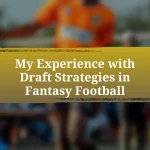Key takeaways:
- Staying adaptable to player performance and injury reports can significantly impact your season’s success in hybrid leagues.
- Engaging with fellow league members to share strategies can enhance understanding and improve decision-making.
- Effective player selection requires objective judgment, even in face of loyalty to underperforming stars; matchup analysis is crucial.
- Understanding different scoring systems can reshape player value assessments and strategies for drafting and trading.
Author: Emma Hartley
Bio: Emma Hartley is an accomplished author known for her compelling narratives that explore the complexities of human relationships and societal themes. With a background in psychology and literature, her work often fuses emotional depth with sharp wit, captivating readers around the world. Emma’s novels have earned critical acclaim and numerous awards, solidifying her place in contemporary fiction. When she’s not writing, she enjoys hiking and volunteering with local literacy programs. Emma resides in Seattle with her two rescue dogs, and she is currently working on her next novel.
Key Strategies for Success
One of the most effective strategies I’ve found in hybrid leagues is to stay adaptable. There are moments during the season when injury reports or unexpected player performances reshape the landscape. I vividly remember a season when I pivoted my lineup after picking up a waiver-wire gem who ended up leading the league in scoring for several weeks. Isn’t it invigorating to think how a single smart move can swing your season?
Engaging with fellow league members can also be a game-changer. I often chat with my friends about their strategies and preferences—there’s nothing like sharing insights over a game day snack. Does anyone else find that these conversations help clarify your own thinking and give you new perspectives?
Lastly, always keep an eye on the game schedule. This might sound simple, but I’ve missed out on key matchups more than once. Knowing which players have favorable fixtures allows you to maximize your lineup’s potential. When was the last time a well-timed roster change led to victory for you? Reflecting on those moments can often inspire better decision-making moving forward.
Managing Player Selections Effectively
Managing player selections effectively in hybrid leagues demands a keen eye for detail. I recall a time when I became overly attached to a star player who was underperforming. Instead of acknowledging my bias, I stubbornly kept him in my lineup, which ultimately cost me crucial points. Have you ever let loyalty cloud your judgment like that? Realizing when to cut the cord can be a hard but necessary lesson.
Another vital aspect is the importance of matchup analysis. I remember agonizing over a choice between two quarterbacks one week. One had the shiny name recognition, but the other was facing a weak defense. Trusting my instinct to start the lesser-known player paid off, as he threw for three touchdowns. That moment taught me the significance of considering the context over just name value.
In hybrid leagues, roster depth can make or break your season. I’ve learned that having reliable backup players is essential, especially during bye weeks or injuries. There was a season when I thought I could get by with just a couple of bench players, only to scramble last minute when several starters went down. How do you feel about having a solid bench? Investing in depth can mean the difference between a consistent performance or a frustrating downturn.
Adapting to Different Scoring Systems
Adapting to different scoring systems in fantasy football can feel like learning a new language. I remember joining a league that awarded points for every reception, which was drastically different from my usual leagues. Suddenly, players I’d never considered became valuable assets, reshaping my approach to drafting and trading. Have you ever found yourself reevaluating your player preferences based on a scoring change?
When I first encountered a league that employed negative scoring for missed field goals, I was completely taken aback. Originally, I’d been excessively focused on acquiring kickers with strong leg power, but I quickly learned to prioritize accuracy above all. It was a pivotal moment when I shifted my strategy; I noticed the influx of points from kickers who rarely missed, transforming my overall score significantly.
Understanding the nuances of scoring can give you a competitive edge. For instance, I once neglected the significance of defensive scoring and paid the price when my opponent’s team racked up points from turnovers. This experience emphasized the need to look beyond the obvious and fully embrace the varied aspects of scoring systems. How can you fine-tune your roster to exploit these scoring intricacies for maximum benefit?














